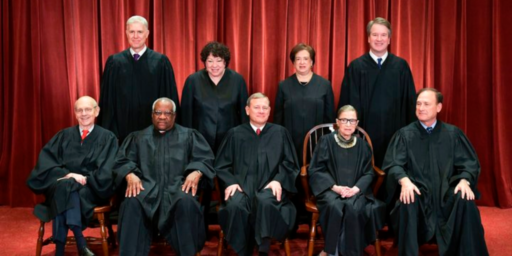Thomas: Overturn Feres Doctrine
The Supreme Court justice least concerned with precedent wants to overturn a longstanding one.

It has long been a bone of contention that members of the armed forces are unable to sue the government even in the most egregious of cases. The longest-serving Republican-appointed Justice wants to change that.
The Associated Press/ABC News (“Over Thomas dissent, high court rejects West Point case“):
The Supreme Court on Monday rejected an appeal from a woman who says she was raped as a West Point cadet, with Justice Clarence Thomas alone arguing that the court should have heard her case.
The woman, who attended the U.S. Military Academy from 2008 to 2010, had sued saying the academy’s leadership tolerated a culture that was hostile toward women and failed to provide adequate support for cadets who are assaulted, among other things. But lower courts said her lawsuit against the U.S. government couldn’t go forward.
Thomas said in a dissent that the high court should have taken the case to reconsider a 70-year-old precedent that prevents members of the military from suing the United States when they are injured while doing their duties.
It is the second time in as many years he has noted his disagreement when the court has declined to revisit the issue. Thomas says the case the court decided decades ago has led to bizarre and surprising results, including barring the former cadet’s case.
“Under our precedent, if two Pentagon employees—one civilian and one a servicemember—are hit by a bus in the Pentagon parking lot and sue, it may be that only the civilian would have a chance to litigate his claim on the merits,” Thomas wrote in a 3-page dissent.
In the West Point case, lower courts said the woman’s claims were barred by the so-called Feres doctrine, which comes from a 1950 Supreme Court case. In it, the Supreme Court held that the Federal Tort Claims Act does not give members of the military the ability to sue the United States for injuries that “arise out of or are in the course of activity incident to” their active duty service in the military.
Thomas wrote that “Feres was wrongly decided; and this case was wrongly decided as a result.” Thomas gave one reason the court may be unwilling to take up the issue.
“Perhaps the Court is hesitant to take up this issue at all because it would require fiddling with a 70-year-old precedent that is demonstrably wrong. But if the Feres doctrine is so wrong that we cannot figure out how to rein it in, then the better answer is to bid it farewell,” he wrote. Thomas cited about half a dozen cases where the court had overturned a precedent including the landmark Brown v. Board of Education case, which outlawed segregation in public schools and overturned the court’s Plessy v. Ferguson decision.
So, on the surface, Thomas would seem unassailably right. While I have no opinion on the merits of the woman’s case, it’s simply unconscionable that she is barred from having it litigated on the basis that she was a cadet. The academy and its leadership certainly had a duty to protect those under their charge.
And this case isn’t even the most egregious in recent memory:
In 2019, however, both Justice Ruth Bader Ginsburg, a liberal, and Thomas, a conservative, indicated they wanted to revisit the Feres doctrine. They said they would have taken a case involving a Navy lieutenant, Rebekah Daniel, who gave birth at a naval hospital and died due to a complication. Her husband was barred from suing because of the Feres doctrine.
While the doctrine is attributed to one case, it was actually part of a group of cases, all from 1950. Wiki:
The Feres case: The District Court dismissed an action by the executrix of Feres against the United States to recover for death caused by negligence. Decedent perished by fire in the barracks at Pine Camp, New York, while on active duty in service of the United States. Negligence was alleged in quartering him in barracks known or which should have been known to be unsafe because of a defective heating plant, and in failing to maintain an adequate fire watch. The Court of Appeals, Second Circuit, dismissed the case.
The Jefferson case: Plaintiff, while in the Army, was required to undergo an abdominal operation. About eight months later, in the course of another operation after plaintiff was discharged, a towel 30 inches long by 18 inches wide, marked “Medical Department U.S. Army,” was discovered and removed from his stomach. The complaint alleged that it was negligently left there by the army surgeon. The District Court, being doubtful of the law, refused without prejudice the Government’s pretrial motion to dismiss the complaint. After trial, finding negligence as a fact, Judge Chesnut carefully reexamined the issue of law and concluded that the Act does not charge the United States with liability in this type of case. The Court of Appeals, Fourth Circuit, affirmed dismissal of the case.
The Griggs case: The District Court dismissed the complaint of Griggs’ executrix, which alleged that while on active duty he met death because of negligent and unskillful medical treatment by army surgeons. The Court of Appeals, Tenth Circuit, reversed and, one judge dissenting, held that the complaint stated a cause of action under the Act.
These cases are so egregious. The Justices on the Vinson court must have been some heartless bastards, indeed. And yet, with respect to the case yesterday,
The Biden administration had urged the court not to take the West Point case. It noted that if Congress wants, it can change the law to permit lawsuits currently barred by the Feres doctrine.
So, it turns out, the 1950 Court wasn’t making up the law out of whole cloth. Under the common law doctrine of sovereign immunity, no citizen could sue the government for anything. The court is, after all, a creature of the government (initially, the Crown itself) and simply would not allow it. But, in 1946, Congress passed the Federal Tort Claims Act (FTCA), which granted some limited exceptions to this doctrine.
At stake in Feres et al, then, wasn’t whether the service members in question had been wronged but whether Congress had waived the United States’ sovereign immunity with respect to members of the armed forces in the FTCA. On perfectly sound grounds, in my judgment, the Court ruled they had not. Essentially, no soldier in the history of the planet had ever been allowed to sue his chain of command and there was nothing in the law that indicated that Congress intended to change that. On this, the Justices were unanimous.
Congress has had 71 years to amend FTCA or otherwise grant servicemembers the right to sue. They have not yet done so.
In the cases in question, I believe this policy is unjust. There is no “good order and discipline” rationale for holding the government immune from the harms committed by incompetent military surgeons in peacetime. But, rather obviously, it would be problematic, indeed, if soldiers, sailors, airmen, and marines were allowed to sue willy-nilly every time they received an order they didn’t like, failed to receive a promotion, or otherwise felt aggrieved.
Clearly, then Congress needs to act here. They need to either amend the FTCA or otherwise carve out narrow exceptions to sovereign immunity for members of of the armed forces.






Cue: tumbleweeds, a fitful breeze and distant, derisive laughter.
Yet another reason to stop playing every side of the question, “Are we at peace, or are we at war?”
@Michael Reynolds: Indeed. But Congress has had 71 years now. The institution was reasonably functional during much of that period and yet declined/failed to act.
@Kingdaddy: Indeed. Although, here, I’m just distinguishing between what happened in the referenced case and, say, a MASH surgeon doing their best under primitive, emergency conditions in a war zone.
This is what a lot of SCOTUS decisions come down to: not whether the judges are “conservative” or “liberal”, but whether they think they should poke their noses in on an issue that they feel should be Congress’s bailiwick to fix. It’s the age old question: are you deciding what the existing law is in an area which is nebulous, or are you making up the law because Congress is shirking its duties?
@grumpy realist:
However, not making a law is the same as making one, in a sense. If Congress is satisfied with things as they are, then failure to make a new law is a statement in itself. See also Roe v. Wade
If we’re basing this all on common law, what happens when sovereign immunity runs into the “ubi jus ibi remedium [where there is a right there must be a remedy]” equity maxim?
@Stormy Dragon: Doesn’t the answer depend on who the sovereign is and what he or she believes to be “rights?”
It is a disturbing day for me when I find myself and Clarence Thomas on the same side of a legal issue, but he’s right.
@Stormy Dragon:
ubi jus ibi remedium depends on the law having established the existence of the right. In the case of the common law. no such right exists, ergo there is no associated remedy required.
In this case, though, Congress did enact law which specifically establishes such a right (albeit a limited one), then explicitly excludes a distinct class from access to it. I don’t believe that the justifications that could be supplied would be sufficient to overcome the implied grant of equal protection contained in the 5th Amendment. The right course here, and again I can’t believe I and Clarence Thomas agree on it, is for the court to examine that exclusion in the context of the 5th Amendment and make a decision that isn’t grounded in a 71 year old sense of deference to the needs of the military (we had just finished fighting one war and were actively engaged in another one when these decisions were handed down.)
@HarvardLaw92:
So just to make sure I understand you here, you’re arguing female members of the military don’t have any right not to be raped by other soldiers?
@HarvardLaw92: Don’t be disturbed–this is one of those “blind hog/truffle” things.
@Stormy Dragon:
No, I’m saying that if we used the common law as our guideline, nobody would have the right to sue the sovereign for anything, but in this case we have superseded the common law with statutory law that creates the right to sue (again, a limited right, but it exists in the law now, whereas under the common law it would not).
I’m on her side – I don’t believe that any realistic compelling interest that the government could proffer would justify denying access to this law to members of the armed forces while extending it to everyone else. It violates 5th Amendment equal protection without a sufficient justification, and the court needs to examine it (and ideally overturn Feres). It’s not a defensible precedent.
@HarvardLaw92:
The the suit isn’t the right in question, it’s the remedy. If she has the right not to be raped and has been, what is her remedy? The rest of the court seems to be arguing she has none
@Stormy Dragon:
It depends on who you are talking about. Under the law as it exists / we’re discussing it, she certainly has the right to sue her rapist individually, and to seek whatever remedies the law provides for her in that respect, but she does not have the right to sue the Army, which is why I was clarifying ubi jus ibi remedium (where there is a right, there is a remedy). The logical converse of that is “where there is no right, there is no remedy”, and that is the situation into which the law unfairly (and IMO unconstitutionally) places this woman and others like her.
Under Feres, with respect to her desire to sue the government and seek equitable relief, the right doesn’t exist, ergo neither does the remedy. Feres creates a situation where the right is denied to her. Were she a civilian employee on West Point who was raped by a co-worker, she’d be able to sue, but solely because this woman was technically a member of the military instead of a civilian ,that same right is denied to her. That is demonstrably in error & contemptuous of the 5th Amendment, and it needs to be corrected.
@Stormy Dragon:
Maybe to simplify that a little (after reading it): you are correct that the rest of the court is saying that, with respect to the government’s failure to protect her, she has no remedy available to her. That is premised on the law denying her the ability to seek that remedy in the first place.
Thomas believes that state of affairs to be wrong, and deserving of the court’s acknowledgement (and correction) of that wrong, and I completely agree with him on that viewpoint.
@HarvardLaw92:
Ha! I thought, “tf?” And took a good long look in the mirror.
@grumpy realist:
Excepting Trump, it’s tough to not work as President. I’m betting he remains an outlier.
The Judicial Branch is overloaded with work. Judges can’t avoid doing their jobs.
Congress…as a body, they pretty much just don’t. Well, unless we consider fundraising as an essential function of legislating.
Say what you will about a bunch of old white dudes surrounded by mahogany indulging in cigars and bourbon, at least deals used to get brokered. I remember reading an article about Skull & Bones years ago. Allegedly every year they tap the one guy on campus who can spend all his time drunk and high while maintaining straight-As. Whether it’s true or not–I’ll take 535 of those over what we have.
Imagine AOC and Rand Paul copping a couple eight balls off Mitch, blowing lines on a portrait of Everett Dirksen, and trying to figure out who to get their respective chambers to end the drug war.
Yes, please.